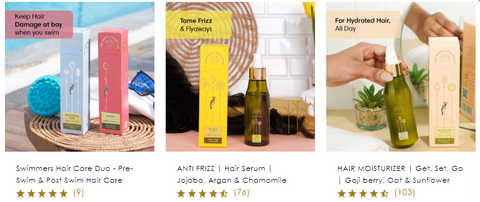Hair Care Product Myths: A Blend of Nature & Science
In the quest for healthy, lustrous hair, we often turn to hair care products to provide the nourishment and care our locks deserve. In today's beauty industry, the blending of nature and science has revolutionised the way we care for our hair.
However, with this progress come misconceptions and myths about the science behind these products. In this blog post, we will explore the incredible synergy of nature and science in hair care products while debunking some common myths.
Myth 1: Natural Ingredients Are Always Better
One prevalent myth is that natural ingredients are always superior to their synthetic counterparts. While natural ingredients have their benefits, such as being gentle on the hair and scalp, the truth is that the effectiveness of a hair care product isn't solely determined by whether it's natural or synthetic.
Many synthetic ingredients are carefully formulated to mimic and enhance the properties of natural ones.
The Science Behind It:
- Hair care products often contain a combination of natural and synthetic ingredients to achieve the desired results.
- Synthetic ingredients can be precisely engineered to penetrate the hair shaft, repair damage, and provide targeted benefits.
- Natural ingredients like argan oil, coconut oil, and aloe vera have been scientifically proven to offer hydration, nourishment, and protection for the hair.
Myth 2: Hair Products Can Repair Split Ends
It's a common misconception that hair care products can magically mend split ends, making a trip to the hair salon unnecessary.
In reality, once a hair strand splits, the only effective solution is to trim it. While some products may temporarily seal split ends, they don't truly repair the damage.
The Science Behind It:
- Split ends occur when the protective outer layer of the hair cuticle becomes damaged, exposing the inner cortex.
- Hair care products may contain ingredients that temporarily bind split ends together and reduce their visibility, but this effect is temporary and washes away.
- To truly repair split ends, a trim is necessary, as products cannot reverse the structural damage.
Myth 3: More Product Equals Better Results
Another misconception is that using a larger amount of hair care product will yield better results. However, using excessive products can often lead to product buildup, leaving hair heavy and greasy.
The Science Behind It:
- Hair care products are formulated with recommended usage instructions to ensure optimal performance.
- Using more product than necessary can overload the hair, making it difficult for the active ingredients to penetrate and deliver their intended benefits.
- Following the recommended usage guidelines allows the product to work effectively without causing buildup.
Myth 4: Natural Oils Replace the Need for Conditioner
Some believe that using natural oils, such as coconut or argan oil, can replace the need for conditioner. While these oils offer moisturising benefits, they do not provide the same conditioning properties as a well-formulated hair conditioner.
The Science Behind It:
- Hair conditioners are specifically designed with a balanced combination of ingredients to provide various benefits, including detangling, smoothing, and enhancing shine.
- While natural oils can add moisture, they may not address all the specific needs of hair that a conditioner can.
- Incorporating both a conditioner and natural oils can provide comprehensive care for your hair.
Myth 5: Hair Products Can Change Hair Texture Permanently
Many people believe that hair care products can permanently alter hair texture, such as making curly hair straight or vice versa. In reality, the effects of these products are temporary and will revert once the product is washed out or wears off.
The Science Behind It:
- Hair texture is determined by the shape of the hair follicle and the arrangement of keratin fibres within the hair.
- Hair care products may temporarily alter the appearance of hair, but they do not change its inherent structure.
- To achieve long-lasting changes in hair texture, treatments like chemical relaxers or perms are required, and these should be performed by professionals.
Myth 6: "All-in-One" Products Are Ideal for Everyone
The idea that a single "all-in-one" hair care product can meet the needs of every hair type is a common misconception. Hair care should be tailored to your specific hair type, concerns, and goals.
The Science Behind It:
- Different hair types have unique needs, whether it's moisture, volume, or frizz control.
- Specialised hair care products are formulated to address specific concerns and provide customised solutions.
- Understanding your hair type and selecting products designed for it is key to achieving the best results.
For hair care products formulated specifically for different concerns and hair types, check out The Earth collective today!

Myth 7: The More Exotic the Ingredient, the Better the Product
It's easy to be swayed by exotic-sounding ingredients in hair care products, assuming that they are more effective. While some unique ingredients offer valuable benefits, the effectiveness of a product depends on the formulation and the specific needs of your hair.
The Science Behind It:
- Exotic ingredients can be beneficial, but their efficacy depends on their concentration and how well they complement other ingredients in the formula.
- Established ingredients like keratin have a strong scientific basis for their effectiveness in hair care.
- The key is to look for products with well-balanced formulations that suit your hair's requirements.
Hair care products that blend the power of nature and science have transformed the way we care for our hair. By debunking these myths and embracing the science, you can achieve the healthy, radiant hair you've always desired.




